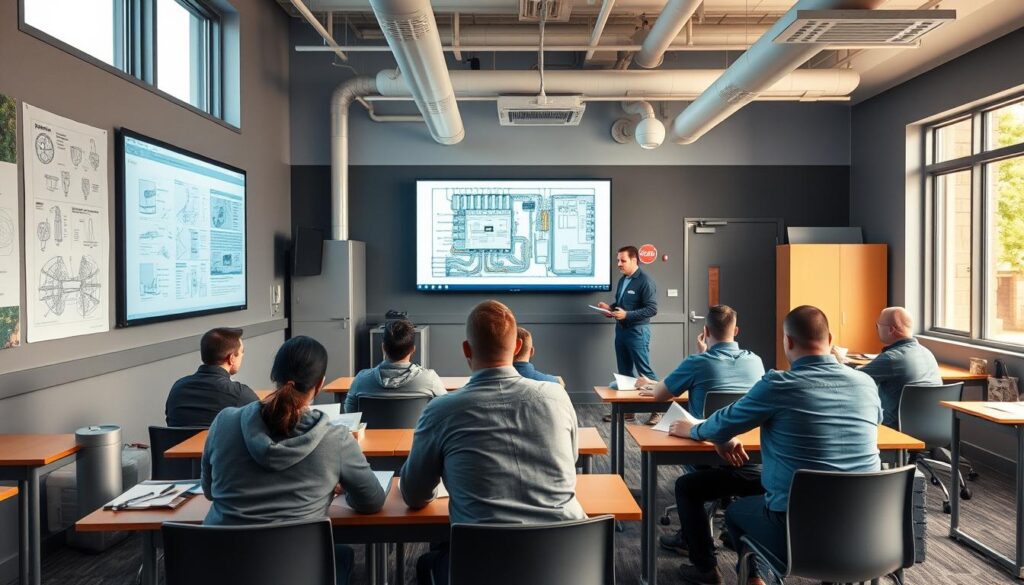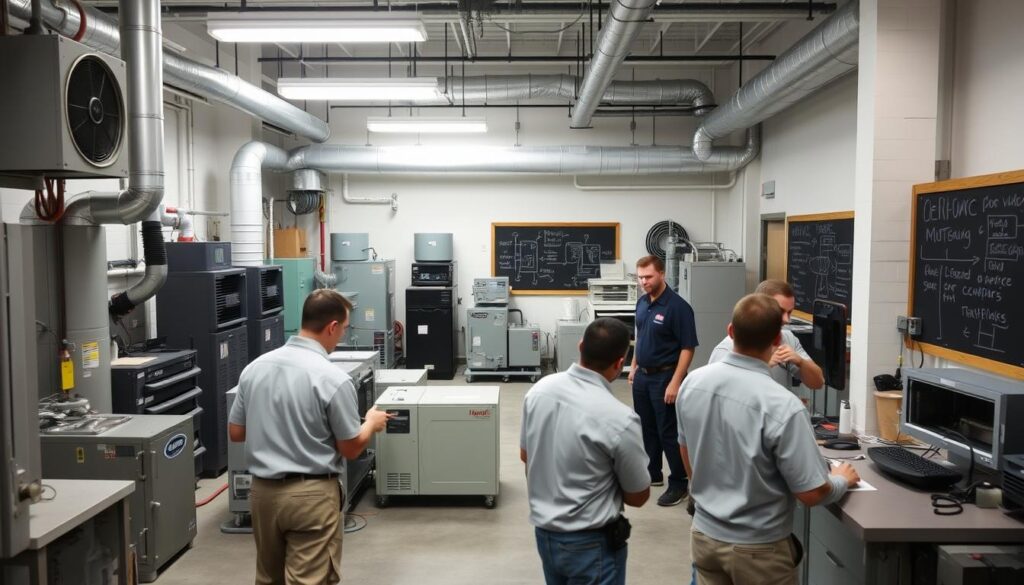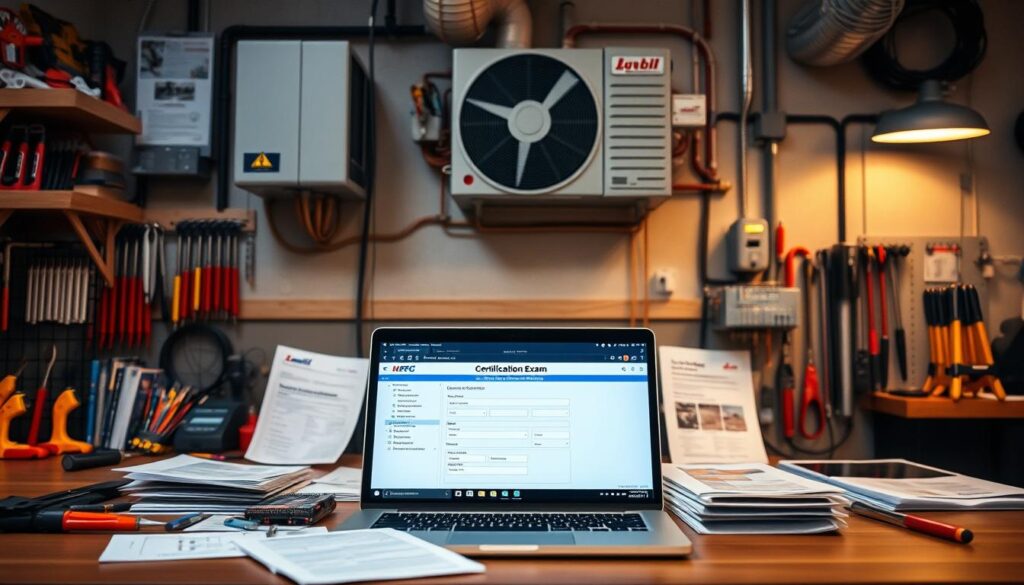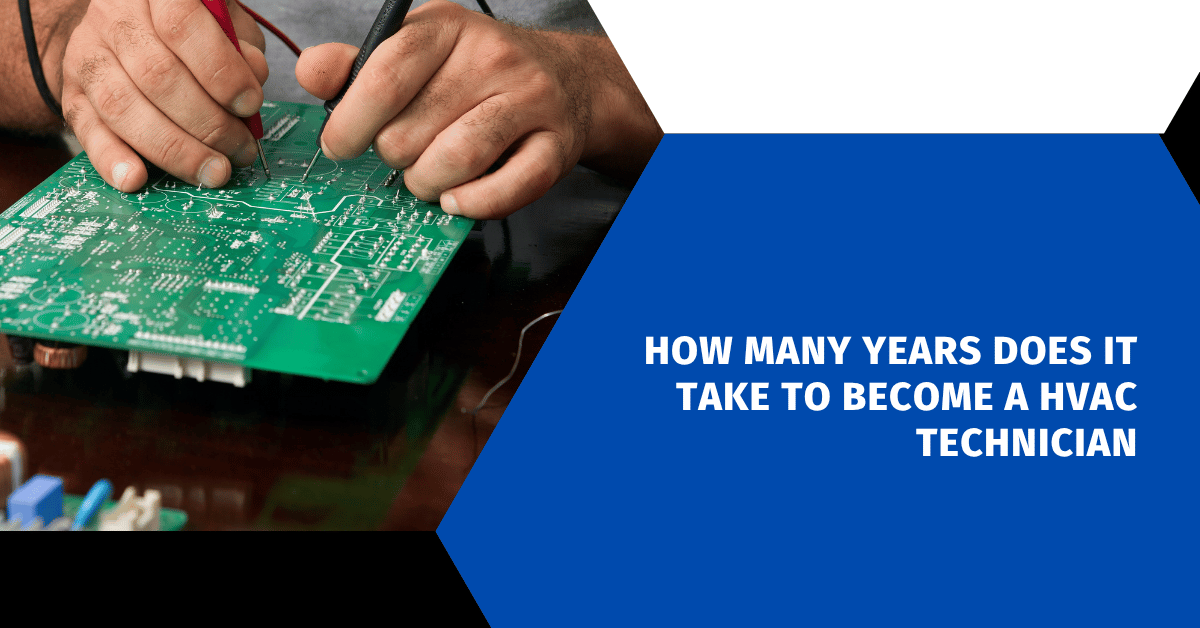Affiliate Disclosure
HVAC Guide Guys is a participant in the Amazon Services LLC Associates Program, an affiliate advertising program designed to provide a means for sites to earn advertising fees by advertising and linking to Amazon.
How Many Years Does It Take to Become a HVAC Technician? Are you curious about how fast you can become a skilled HVAC technician? The path to becoming an HVAC pro offers quick ways to get started. These options are much faster than traditional career paths.

HVAC technicians are key to keeping places comfortable and safe. Your journey into this field can change a lot. It depends on your training choice and how hard you work.
Figuring out how long it takes to become a HVAC tech involves a few important things. These include your education, apprenticeships, and how fast you learn. Some people finish their training in just six months. Others might spend two to four years getting fully educated and certified.
Key Takeaways
- HVAC training duration ranges from 6 months to 4 years
- Multiple educational paths exist for aspiring technicians
- Hands-on training is key for success
- Certification and licensing needs vary by state
- Staying up-to-date is vital in the HVAC world
Table of Contents
Understanding HVAC Career Paths and Training Options
Exploring the HVAC technician career path means looking at different training options. Your journey can take many paths, each with its own benefits for new professionals.
The HVAC education requirements vary, giving you choices in how to grow your career. Let’s look at the main training options for starting your career in heating, ventilation, and air conditioning.
Traditional Education Paths
Traditional ways to become an HVAC technician include structured programs. These paths offer detailed training through:
- Community college degree programs
- Technical institute certifications
- Four-year university engineering tracks
Alternative Training Approaches
But, your HVAC technician career path isn’t just about classroom learning. There are also practical, hands-on training options:
- Apprenticeship programs
- On-the-job training
- Online certification courses
| Training Option | Duration | Estimated Cost |
|---|---|---|
| Community College Program | 2-3 years | $10,000-$25,000 |
| Apprenticeship | 3-5 years | Minimal (often paid training) |
| Vocational School | 6-24 months | $5,000-$15,000 |
Career Entry Points
You can enter the HVAC industry at different times. Some start as apprentices, while others begin with formal education. The important thing is to choose a path that fits your goals and learning style.
No matter your path, building strong technical skills and keeping up with new technology is key to success in this changing field.
Explore Our HVAC Shop
Looking for top-rated HVAC tools, parts, and accessories? Visit our shop and find the perfect solution for your needs.
Visit the ShopHow Many Years Does It Take to Become a HVAC Technician
Becoming an HVAC technician takes a certain amount of time, depending on your path. The time needed ranges from 6 months to 4 years. This gives you flexibility to fit your learning style and career goals.
There are several ways to become an HVAC professional. Each path has its own opportunities and challenges:
- Certificate Programs: 6-12 months
- Associate Degree: 2 years
- Apprenticeship: 3-5 years
- Technical Training: 1-2 years
The length of your HVAC training depends on a few important factors:
| Training Path | Average Duration | Key Characteristics |
|---|---|---|
| Vocational School | 6-12 months | Fastest entry into the field |
| Community College | 2 years | Comprehensive theoretical training |
| Apprenticeship | 3-5 years | Earn while you learn |
Pro tip: Your individual learning speed, local licensing requirements, and chosen specialization can significantly impact your hvac certification timeline.
Selecting the right training path is key to your HVAC career success.
Remember, continuous learning is vital in the HVAC field. Your initial qualification is just the start of a dynamic and rewarding career.
Explore Our HVAC Shop
Looking for top-rated HVAC tools, parts, and accessories? Visit our shop and find the perfect solution for your needs.
Visit the ShopVocational School Programs: Fast-Track to HVAC Certification
HVAC trade school programs are a quick way to start your HVAC career. They offer a fast track to learning the skills you need. This way, you can get ready for your HVAC job in no time.
Vocational schools teach you to become a skilled HVAC technician fast. Programs last from 6 to 12 months. This makes them perfect for those who want to start their career quickly.
Program Structure and Duration
When you join an HVAC trade school program, you’ll go through:
- Comprehensive classroom instruction
- Hands-on technical training
- Preparation for industry-standard certifications
Comprehensive Curriculum Components
A good HVAC vocational program covers important technical areas:
| Course Area | Key Learning Objectives |
|---|---|
| Refrigeration Systems | Understanding cooling mechanisms and component interactions |
| Electrical Systems | Wiring, circuit analysis, and electrical safety protocols |
| Heating Technologies | Gas, electric, and alternative heating system operations |
Practical Training Requirements
Getting hands-on experience is key in HVAC trade school programs. You’ll learn by:
- Doing lab simulations
- Working on equipment maintenance
- Practicing real-world installations
“Vocational HVAC programs bridge the gap between theoretical knowledge and practical application, preparing you for immediate workforce entry.” – HVAC Industry Training Association
Choosing a vocational program can cut down your HVAC career prep time. You’ll also get recognized industry credentials.
HVAC Apprenticeship Programs: Duration and Requirements

HVAC apprenticeship programs are a great way to become a skilled technician. They last 3-5 years, mixing classroom learning with hands-on experience. The length of your apprenticeship depends on the program and local rules.
During your training, you’ll learn valuable skills. Apprenticeships combine theory with practical work. This way, you earn while you learn, gaining skills directly useful in the HVAC field.
- Typical apprenticeship duration: 3-5 years
- Classroom learning: 144 hours per year
- On-the-job training: 2,000 work hours annually
- Paid training with progressive wage increases
To start an apprenticeship, you need to meet certain requirements. You’ll usually need:
- High school diploma or equivalent
- Minimum age of 18
- Basic math and reading skills
- Physical fitness for technical work
Pro tip: Many technical schools and unions offer apprenticeship programs. They can kickstart your HVAC career with structured, thorough training.
“An HVAC apprenticeship is more than just a job—it’s a career-building journey.” – HVAC Industry Professional
Explore Our HVAC Shop
Looking for top-rated HVAC tools, parts, and accessories? Visit our shop and find the perfect solution for your needs.
Visit the ShopEssential Skills and Knowledge Development Timeline
Getting good at HVAC needs a deep dive into learning. Your time in HVAC school is all about picking up many technical skills. These skills are key to a great career in heating, ventilation, and air conditioning.
Learning HVAC skills is a step-by-step process. It covers all the important education needs through several stages:
- Foundational Technical Understanding
- Advanced System Diagnostics
- Practical Application Skills
- Safety Protocol Mastery
Technical Competencies Development
Your technical skills will grow by understanding complex HVAC systems. You’ll learn to:
- Analyze refrigeration cycles
- Diagnose electrical system issues
- Understand heating and cooling mechanisms
- Perform precise equipment maintenance
Safety Protocol Training
Safety is always first in HVAC training. Programs teach strict safety rules. This ensures you can work safely and well in many places.
Industry-Specific Software Skills
Today’s HVAC pros need to be tech-savvy. You’ll learn to use special software for system design, energy modeling, and analysis. Being good with digital tools is very important for moving up in your career.
Continuous learning is key to success in HVAC.
State Licensing Requirements and Timeframes
The HVAC licensing process is complex and varies by state. To become a licensed HVAC technician, you must follow several key steps. These steps affect your overall hvac certification timeline.
Each state has its own rules for HVAC professionals. The process usually includes:
- Completing required educational programs
- Accumulating documented work experience
- Passing state-specific examinations
- Maintaining ongoing professional certifications
The time it takes to get licensed ranges from 2-5 years. This depends on your state’s rules. Some states have fewer requirements, while others need more training and experience.
Important factors for your HVAC certification timeline are:
- Minimum age requirements (usually 18 years old)
- Documented work hours under licensed professionals
- Passing technical and safety examinations
- Background checks and proof of insurance
Looking up your state’s licensing board is key. It gives you the most accurate info for your career. Preparing early and knowing these requirements helps plan your HVAC career.
Explore Our HVAC Shop
Looking for top-rated HVAC tools, parts, and accessories? Visit our shop and find the perfect solution for your needs.
Visit the ShopAccelerated Training Programs vs. Traditional Education
Looking into hvac trade school programs, you’ll find different ways to start your career. Choosing between fast training and traditional education greatly affects your HVAC career path.
Cost Comparison
Understanding hvac education needs means looking at the cost of training. Fast programs are often cheaper:
- They last less time, so you pay less tuition
- With fewer semesters, you spend less money
- You might see a quicker return on your investment
Time Investment Analysis
Your time is precious when you’re getting into HVAC. Fast training programs offer a quick way to get certified:
- Traditional programs take 2-4 years
- Fast programs last 6-12 months
- Apprenticeships take 3-5 years
Career Outcome Differences
The training you choose can shape your career. Fast programs focus on practical skills that employers want. Traditional education gives you broad knowledge, but fast training gets you to work sooner.
Speed doesn’t mean less quality in HVAC education today.
Your career goals and personal situation will guide your choice. Look into local HVAC programs and talk to industry experts to decide wisely.
Professional Certification and Continuing Education

Getting ahead in HVAC needs more than just starting training. Professional certification shows you’re an expert and serious about your work. The hvac certification timeline has several important steps that can really improve your career.
Getting certified by the industry can open up more job chances. The North American Technician Excellence (NATE) certification is a top choice for HVAC pros. Here’s what you need to do to get certified:
- Complete the needed work experience
- Pass specific knowledge exams
- Keep up with ongoing education credits
Getting certified usually takes 1-2 years, based on your experience and education. There are different certifications for different HVAC skills:
- Air Conditioning Specialization
- Commercial Refrigeration
- Heat Pump Certification
- Commercial Air Conditioning
Keeping up with new tech is key in HVAC. Most certifications need:
- Annual continuing education credits
- Regular skills recertification
- Staying current with new industry tech
Professional growth in HVAC is a continuous journey of learning and skill development.
Investing in your certification can lead to better pay, more job chances, and more respect in the HVAC field.
Explore Our HVAC Shop
Looking for top-rated HVAC tools, parts, and accessories? Visit our shop and find the perfect solution for your needs.
Visit the ShopCareer Advancement Opportunities and Timeline
Exploring your HVAC technician career path is full of exciting opportunities. As you gain experience, you’ll find many ways to grow and specialize in the HVAC field.
The time you spend preparing for your HVAC career can affect your advancement. HVAC technicians usually go through several stages:
- Entry-Level Technician: Your first job with basic installation and repair skills
- Senior Technician: You’ll handle advanced troubleshooting and manage complex systems
- Specialized Technician: You’ll focus on specific areas like commercial or industrial HVAC systems
- Service Manager: A supervisory role overseeing technical teams
- Business Owner: A chance to start your own business for experienced professionals
To move up in your HVAC career, you need to keep learning and improving your skills. Getting extra certifications, like NATE (North American Technician Excellence), can help you grow faster. Training in energy efficiency, green technologies, and advanced control systems can also set you apart in the HVAC market.
Going from entry-level to management can take 5-10 years. It depends on your hard work, extra training, and how well you do. It’s important to network, keep up with new tech, and show off your technical skills to move up.
Conclusion
Becoming an HVAC technician has many training paths. The time it takes can vary from a few months to several years. Your goals, budget, and local job market will help choose the best path for you.
The length of HVAC training depends on your education choice. Vocational schools offer quick certifications, while degrees provide deeper technical knowledge. Apprenticeships mix classroom learning with hands-on experience, giving a full view of the field.
Each training option has its benefits. Some can be finished in under a year, while others take 2-4 years. It’s important to pick a program that fits your career goals and offers strong skills training. Look into local needs, industry standards, and find a path that matches your professional dreams.
The HVAC industry is growing, with great opportunities for skilled technicians. Your commitment to learning and growing will be key to a successful career. With the right training and dedication, you can become a valuable professional in this important field.
FAQ
How long does it typically take to become an HVAC technician?
What are the main training options for becoming an HVAC technician?
Do I need a license to work as an HVAC technician?
What certifications are important for HVAC technicians?
Is an apprenticeship better than a vocational school program?
What skills do I need to become a successful HVAC technician?
How much does HVAC training typically cost?
How long does it typically take to become an HVAC technician?
What are the main training options for becoming an HVAC technician?
Do I need a license to work as an HVAC technician?
What certifications are important for HVAC technicians?
Is an apprenticeship better than a vocational school program?
What skills do I need to become a successful HVAC technician?
How much does HVAC training typically cost?
FAQ
How long does it typically take to become an HVAC technician?
The time it takes to become an HVAC technician varies. Vocational schools take 6-12 months. Apprenticeships last 3-5 years. Community college programs are 2 years. Some certification programs can be done in 6 months.
What are the main training options for becoming an HVAC technician?
You can choose from vocational schools, community college, apprenticeships, or trade school certifications. Each offers unique benefits. You can get quick certification or hands-on training that combines classroom and work experience.
Do I need a license to work as an HVAC technician?
Licensing needs vary by state. Most states require a license. This involves training, work experience, and a professional exam. Getting licensed can take 1-2 years.
What certifications are important for HVAC technicians?
Certifications from NATE (North American Technician Excellence) are key. They show you have advanced skills and knowledge. You need to pass exams after gaining experience.
Is an apprenticeship better than a vocational school program?
Both have benefits. Apprenticeships offer paid training and experience, lasting 3-5 years. Vocational programs are quicker (6-12 months) and cheaper, getting you into the workforce fast. Your choice depends on your goals and learning style.
What skills do I need to become a successful HVAC technician?
You need technical skills in electrical, refrigeration, and heating. Also, problem-solving, physical stamina, and customer service skills are important. Safety knowledge, industry software understanding, and continuous learning are key for success.
How much does HVAC training typically cost?
Costs vary. Vocational programs cost
FAQ
How long does it typically take to become an HVAC technician?
The time it takes to become an HVAC technician varies. Vocational schools take 6-12 months. Apprenticeships last 3-5 years. Community college programs are 2 years. Some certification programs can be done in 6 months.
What are the main training options for becoming an HVAC technician?
You can choose from vocational schools, community college, apprenticeships, or trade school certifications. Each offers unique benefits. You can get quick certification or hands-on training that combines classroom and work experience.
Do I need a license to work as an HVAC technician?
Licensing needs vary by state. Most states require a license. This involves training, work experience, and a professional exam. Getting licensed can take 1-2 years.
What certifications are important for HVAC technicians?
Certifications from NATE (North American Technician Excellence) are key. They show you have advanced skills and knowledge. You need to pass exams after gaining experience.
Is an apprenticeship better than a vocational school program?
Both have benefits. Apprenticeships offer paid training and experience, lasting 3-5 years. Vocational programs are quicker (6-12 months) and cheaper, getting you into the workforce fast. Your choice depends on your goals and learning style.
What skills do I need to become a successful HVAC technician?
You need technical skills in electrical, refrigeration, and heating. Also, problem-solving, physical stamina, and customer service skills are important. Safety knowledge, industry software understanding, and continuous learning are key for success.
How much does HVAC training typically cost?
Costs vary. Vocational programs cost $1,500 to $15,000. Community college programs are $3,000 to $10,000. Apprenticeships are often free or paid. Financial aid and scholarships can help with costs.
What are the career advancement opportunities in HVAC?
HVAC technicians can move to specialized roles like commercial HVAC or energy efficiency. With more certifications and experience, you can become a supervisor or start your own business. You can also specialize in industrial HVAC systems.
,500 to ,000. Community college programs are ,000 to ,000. Apprenticeships are often free or paid. Financial aid and scholarships can help with costs.
What are the career advancement opportunities in HVAC?
HVAC technicians can move to specialized roles like commercial HVAC or energy efficiency. With more certifications and experience, you can become a supervisor or start your own business. You can also specialize in industrial HVAC systems.

